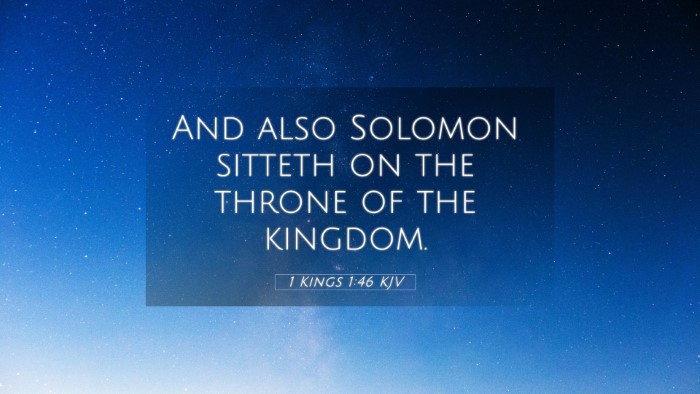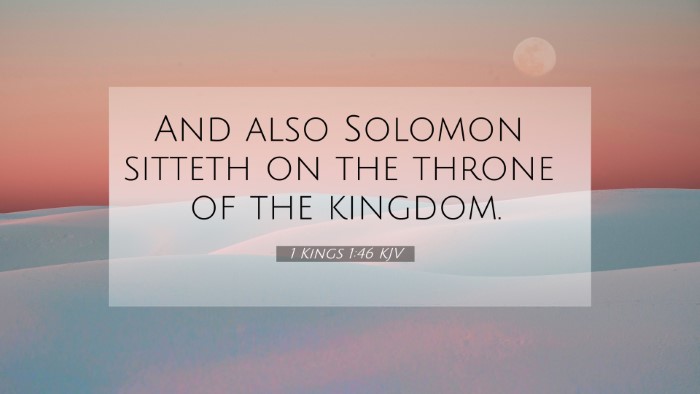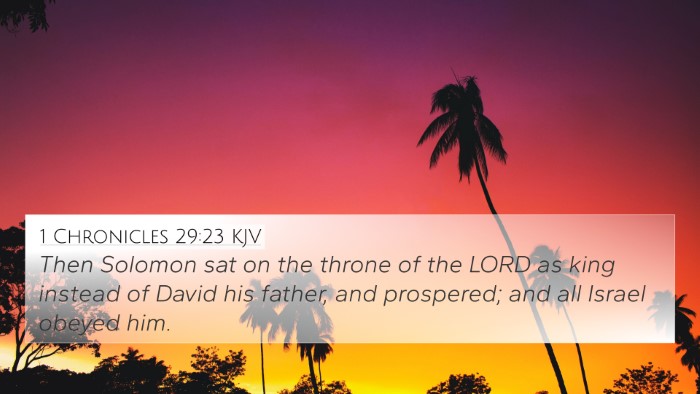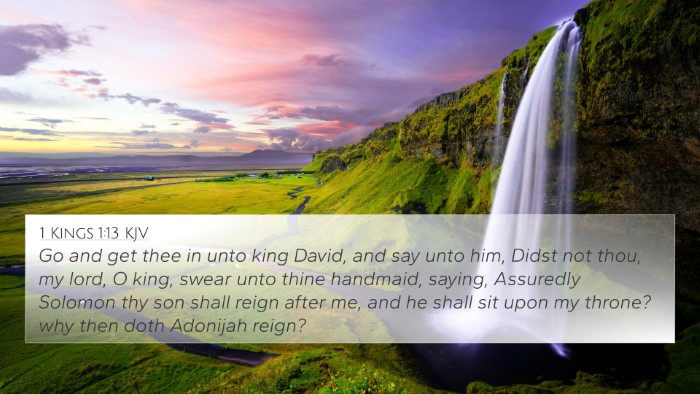Understanding 1 Kings 1:46
Bible Verse: 1 Kings 1:46 - "And also Solomon sitteth on the throne of the kingdom."
Summary of Meaning
In this verse, the affirmation of Solomon as king signifies the transition of power in Israel. Here, we see a pivotal moment where Solomon takes his rightful place on the throne, indicating God’s choice for leadership, and fulfilling David's promise regarding succession. This moment is both politically and spiritually significant, as Solomon’s rule is connected to the divine covenant made with David.
Commentary Insights
-
Matthew Henry:
Henry emphasizes the significance of Solomon's ascension to the throne as a fulfillment of God's plan. He notes that Solomon's kingdom brings peace and prosperity, contrasting with the turmoil that often marks the transition of power within the realm.
-
Albert Barnes:
Barnes explores the implications of Solomon’s kingship, pointing out that this selection showcases the continuation of God’s promise. He suggests that the unity of Israel under Solomon is crucial to understanding the history of the nation.
-
Adam Clarke:
Clarke views this verse as a celebration of God’s covenant, elaborating on the divine endorsement of Solomon’s reign. He reflects on the prophecies given to David that underscore the establishment of Solomon’s rule, highlighting the fulfillment of God’s promises to His people.
Cross-References
This verse has numerous connections to other parts of Scripture, enhancing our understanding through thematic Bible verse connections. Here are some related verses:
- 2 Samuel 7:12-13: God's promise to David about his offspring building the temple.
- 1 Chronicles 22:9-10: David’s instructions to Solomon regarding the temple.
- 1 Kings 2:12: The establishment of Solomon as king over Israel.
- Proverbs 4:7: The importance of wisdom in ruling, a theme relevant to Solomon’s reign.
- Psalm 72: A prayer for the king, potentially prophetic of Solomon’s rule.
- 1 Kings 3:5: Solomon asking for wisdom as he steps into leadership.
- Matthew 1:6: The lineage of Jesus through David and Solomon, emphasizing their significance.
- Hebrews 1:5: Establishing the uniqueness of Christ over the angels in relation to God’s sons.
- Revelation 3:21: Reference to reward and authority in the kingdom, paralleling Solomon’s kingship.
Thematic Connections
The thematic elements present in this verse are reinforced through inter-Biblical dialogue, where leadership, divine selection, and the covenant theme play crucial roles. Solomon’s kingship represents an era of stability and is often compared to the tumultuous reigns that preceded and followed it.
Furthermore, the connections between this verse and New Testament teachings serve to highlight the enduring nature of God’s promises. The notion of kingship is redefined in the New Testament through Christ, establishing a parallel that deepens our understanding of Biblical leadership.
Tools for Cross-Referencing
To dive deeper into cross-referencing Biblical texts, consider utilizing the following resources:
- Bible Concordance
- Bible Cross-Reference Guide
- Cross-Reference Bible Study Tools
- Bible Study Software with Reference Systems
- Concordances specific to Old Testament and New Testament
- Biblical Reference Resources for deeper studies
- Comprehensive Bible Cross-Reference Materials
Applications and Reflections
Understanding 1 Kings 1:46 invites us to reflect on our own leadership roles, whether in our families, workplaces, or communities. Solomon’s wisdom was pivotal; we too are called to seek divine wisdom in our choices. This passage encourages believers to recognize God’s sovereignty in appointing leaders and to trust in His plans even in times of uncertainty.
May this study inspire you to explore the connections between Bible verses, identify cross-referenced themes, and engage in comparative Bible verse analysis that enriches your faith journey.






